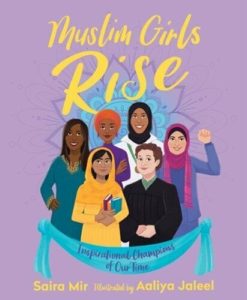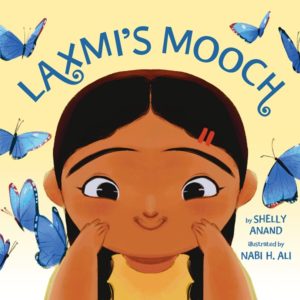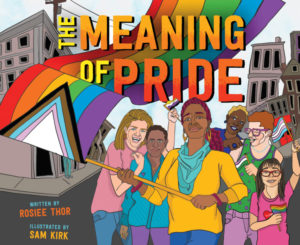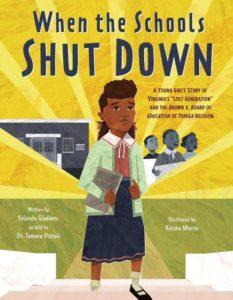 This month’s Industry Insider interview is with Saba Sulaiman, a literary agent at Talcott Notch Literary Services. While I could put all kinds of traditional bio things here, I’m going to instead offer part of her own terrific Twitter bio. “Eternally recovering from maternity leave. Probably hiding behind the crib, eating cake.” With an awesome Twitter bio like that, what more do you need to know?
This month’s Industry Insider interview is with Saba Sulaiman, a literary agent at Talcott Notch Literary Services. While I could put all kinds of traditional bio things here, I’m going to instead offer part of her own terrific Twitter bio. “Eternally recovering from maternity leave. Probably hiding behind the crib, eating cake.” With an awesome Twitter bio like that, what more do you need to know?
We’ll give more anyway, because that’s what we do here at OPB.
Saba admits that when she’s not reading, she’s likely:
- running after two small children,
- secretly learning another language,
- playing Scrabble,
- watching a Bollywood movie,
- or singing in the bathroom.
If you REALLY want to know the regular bio stuff, I’ll get to that in the interview itself. Speaking of that, let’s get right to it!
RVC: Rumor has it that your sister played a big role in your initial love for books.
SS: She did! She was (and remains) a big reader and there’s no way I would’ve gotten into reading at all if it weren’t for how much she influenced me (read: how obsessed I was with everything she did) when we were young. She’d probably argue that there’s very little that’s original about me, to be honest, but isn’t that true for everyone?
RVC: That sure can feel like the case from time to time! Now, from the start, you were culturally displaced. How did that affect your reading interests and your relationship to language?
SS: Until I came to the US for college, I spent my whole life being expected to know a language I didn’t know well enough, and was then ridiculed for not being fluent enough. My petulant (and understandable, in retrospect) reaction to it was to make sure my English (the only language I felt confident speaking) was better than anyone else’s, and I think reading a lot helped with that. And then, of course, because my life got so much easier in the US when language wasn’t a barrier anymore, I decided to complicate it further and start learning three more languages in college.
RVC: Wow.
SS: I know.
RVC: Were your graduate studies in Persian literature at the University of Chicago a path toward your future publishing career, or were you still thinking of other career options?
SS: You know what they say: everything in your past plays a role in how things turn out in the future. I wasn’t thinking about publishing at all when I began graduate school—in fact, I was fairly sure I’d purse a Ph.D. and a career in academia. But my experience there definitely informed the kinds of books I tend to gravitate towards, and how I think about, read, and evaluate writing.
RVC: The next step in your journey took you to Sourcebooks as an editorial intern. Their home base is in Naperville, Illinois, right? What kinds of things did they have you doing there?
SS: I was actually at one of their satellite offices in Milford, CT, where their romance imprint is run. It was an incredible experience, truly—they had me write back cover copy my first day there, if that’s any indication of how happy they were to throw me into the deep end. I read submissions and wrote reports on them, attended acquisitions meetings, maintained their various author and comp title databases, and assisted the editors there with anything they needed help with. It was a really comprehensive and wonderful introduction to publishing, and I had a blast.
RVC: What was the most valuable lesson you learned while at Sourcebooks?
SS: I think it’s a combination of a few things: that working with good people is a highly underrated and very necessary aspect of enjoying your work; that supporting and advocating for people looks very different depending on the person; and that there is actually very little reading involved in the work we do (at least during office hours, alas), but that it’s absolutely essential not to lose sight of how important it is to keep in touch with what’s being published so we can best help our authors thrive.
RVC: Let’s tackled a super-basic issue. Why is agenting the right fit for you?
SS: I get to work very closely with creative professionals and help them achieve their goals without having to take on the actual work and stress of creating art, plus I’m surrounded by people who inspire me and I get to read a lot and call it market research—what’s there not to love? I’m also a bit of a Mother Hen, and agenting allows me to channel my protective instincts in a pretty satisfying way.
RVC: You say that being an author today is an entrepreneurial enterprise. What do you mean by that?
SS: Since publishers can’t support all the authors they publish with equal amounts of fervor when it comes to marketing and publicity, authors are expected to participate as much as they can in doing outreach, finding and connecting with their audience via libraries, conferences, and social media, and making promotional material that can aid in increasing their books’ visibility and sales. It requires time, energy, and a lot of strategy development and implementation for each author to figure out what works for them, which is why it’s much more of an entrepreneurial role than it used to be, say, fifty years ago.
RVC: Do picture book authors and illustrators have to do as much of this PR work as writers for a MG, YA, or adult audience?
SS: I think the nature of the work required is different but the amount is comparable. PB writers may not have to do a lot in terms of being personally active on social media in order to connect with their audience, but they often have to focus more on the school and library market–being available for story times, both virtual and in real life at bookstores and libraries (where safety permits), presenting their books to students at schools via classroom visits, etc. All authors want their books to find more readers–the process is just different for PB writers.
RVC: I’ve heard you say that you think every author should have an agent. Care to explain that a bit more? Especially as to how it might pertain to self-published authors?
SS: Well, first of all, I will admit that I’m clearly biased since I am an agent, but I do think having someone in your corner whose entire job is to support and advocate for you, find opportunities for you to improve your craft and publish widely, review your contracts and advise you on how you manage your career overall–especially in an industry as frustratingly esoteric as publishing–is very useful. Authors can certainly manage their careers without agents, especially if they’re fairly certain they want to self-publish and continue to do so, but it requires doing a lot of research that is hard to access without the help of a professional who has had the experience working in this space, as well as having a tremendous amount of energy—energy that I think would be better served being channeled into writing their manuscripts.
Finding a good agent isn’t just a means to an end, it’s a long-term investment in your career, and a wise decision, I believe.
RVC: What was the first picture book you sold? What made you want to represent it?
 SS: The first PB I sold was Muslim Girls Rise by my client Saira Mir (illustrated by Aaliya Jaleel). I fell completely in love with it because it was written so beautifully and with such clarity and an earnest desire to share these exceptional women’s voices. Also as a Muslim woman myself, I found that even I hadn’t heard of a majority of these women before I read this submission, so I knew I had to do my part to help make their inspiring stories available to read for kids all over the world.
SS: The first PB I sold was Muslim Girls Rise by my client Saira Mir (illustrated by Aaliya Jaleel). I fell completely in love with it because it was written so beautifully and with such clarity and an earnest desire to share these exceptional women’s voices. Also as a Muslim woman myself, I found that even I hadn’t heard of a majority of these women before I read this submission, so I knew I had to do my part to help make their inspiring stories available to read for kids all over the world.
RVC: I’ve got a copy of that one–it’s a worthy book, indeed. Now, let’s throw a bone to the writers out there. What do you want to see out of submissions? What are some must-haves and turn offs?
SS: In picture books, I’m drawn most to stories with a nuanced emotional takeaway, fun wordplay, notes of whimsy, textual economy, and memorable characters. I love smart, unexpected narratives where authors are experimenting structurally; I love funny books, both the sweet and soft kind and the wry, dry kind; I love layered storytelling with subtextual richness that can provide a launchpad for readers to start a conversation; and I love idiosyncratic narratives that take mundane processes and make them seem utterly delightful. I also represent non-fiction, and am particularly interested in creative storytelling with a STEM component, biographies of lesser-known trailblazers who have made a significant impact in their fields, stories with environmental themes, and creative nonfiction that almost feels like it could be shelved in the fiction section. I’m also always especially excited when I receive submissions from BIPOC creators, queer creators, disabled creators, immigrant creators, and creators who are writing stories of joy and celebration at the intersection of these identities.
RVC: Is there anything you don’t want to see?
SS: I don’t usually find stories that have a very heavy moral or “lesson” component very appealing.
RVC: Picture book trends. Should writers pay attention to them?
SS: Writers should absolutely pay attention to trends–knowing what kinds of stories the market is responding to at any given point is important because books aren’t published in a vacuum. Writers can (and should feel free to) choose not to respond to or write to these trends, but I do think they should know what kinds of books are selling if they’re seriously pursuing publication.
RVC: How do you describe your agenting style?
SS: Forthright, honest, encouraging, collaborative, and flexible.
RVC: One final question for this part of the interview, Saba. What’s are some picture-book projects that you’d like to brag about?

 SS: Ooh yes, thank you for the opportunity! This year a picture book very dear to my heart called Laxmi’s Mooch by my client Shelly Anand (and illustrated by Nabi H. Ali) was published–it’s a really sweet, joyful story that celebrates body hair and inspires kids to be confident about who they are—it was featured on the Today Show which was really thrilling!
SS: Ooh yes, thank you for the opportunity! This year a picture book very dear to my heart called Laxmi’s Mooch by my client Shelly Anand (and illustrated by Nabi H. Ali) was published–it’s a really sweet, joyful story that celebrates body hair and inspires kids to be confident about who they are—it was featured on the Today Show which was really thrilling!
And then next year, I have three PBs forthcoming: The Meaning of Pride by Rosiee Thor (illustrated by Sam Kirk), Zahra’s Blessing by Shirin Shamsi (illustrated by Manal Mirza), and If You’re a Kid Like Gavin by Kyle Lukoff and Gavin Grimm (illustrated by J. Yang), all of which I’m very excited about!
RVC: Alrighty. It’s now time to double the points, double the speed, and double the overall goodness. Welcome to…THE LIGHTNING ROUND! Are you ready?
SS: Go for it!
RVC: Biggest time waster?
SS: Someone sent me a few funny Instagram Reels and I made the mistake of going back to browse for more–don’t get sucked in, it’s a trap!!! Even more so than TikTok, I think, because of how much shorter the videos are and how easy it can be to tell yourself you’ll only watch one more…
RVC: If we overheard you singing in the shower (we get it—the acoustics are great!), you’d be belting out…
SS: It varies a lot depending on my mood but “I Want More” from The Little Mermaid is definitely a repeat offender and has been since I was a kid–both my mom and my husband can definitely attest to that.
RVC: A favorite autocorrect misadventure?
SS: I once praised a client for how fantastic and transportive their decryptions are. That was fun!
RVC: A recent picture book that really impressed you?
 SS: Ooh, there are so many but I’ll name the most recent one–it’s a picture book biography coming out in January 2022 from HarperCollins called When the Schools Shut Down by Yolanda Gladden and Dr. Tamara Pizzoli, and illustrated by Keisha Morris. It’s got such beautiful, contemplative, rich, nuanced, and rousing storytelling, such gorgeous, warm illustrations, and it’s such an expansive story told with intimate, emotionally exacting detailing–I just love it. Both the author and illustrator really managed to convey a sense of Yolanda Gladden’s soul, her family, and her nurturing community, which is so difficult to do with a PB biography.
SS: Ooh, there are so many but I’ll name the most recent one–it’s a picture book biography coming out in January 2022 from HarperCollins called When the Schools Shut Down by Yolanda Gladden and Dr. Tamara Pizzoli, and illustrated by Keisha Morris. It’s got such beautiful, contemplative, rich, nuanced, and rousing storytelling, such gorgeous, warm illustrations, and it’s such an expansive story told with intimate, emotionally exacting detailing–I just love it. Both the author and illustrator really managed to convey a sense of Yolanda Gladden’s soul, her family, and her nurturing community, which is so difficult to do with a PB biography.
RVC: Three must-haves in a picture book manuscript?
SS: Voice, kid-appeal, and a sense of sincerity.
RVC: Best moment in your agenting career (so far)?
SS: Probably the day I found out one of my clients got longlisted for the National Book Award–I was actually in the middle of what’s been one of my best runs to date, so it was a great personal moment as well!
RVC: Thanks for joining us here at OPB, Saba. Best of luck with everything!
SS: Thanks for having me, Ryan!

